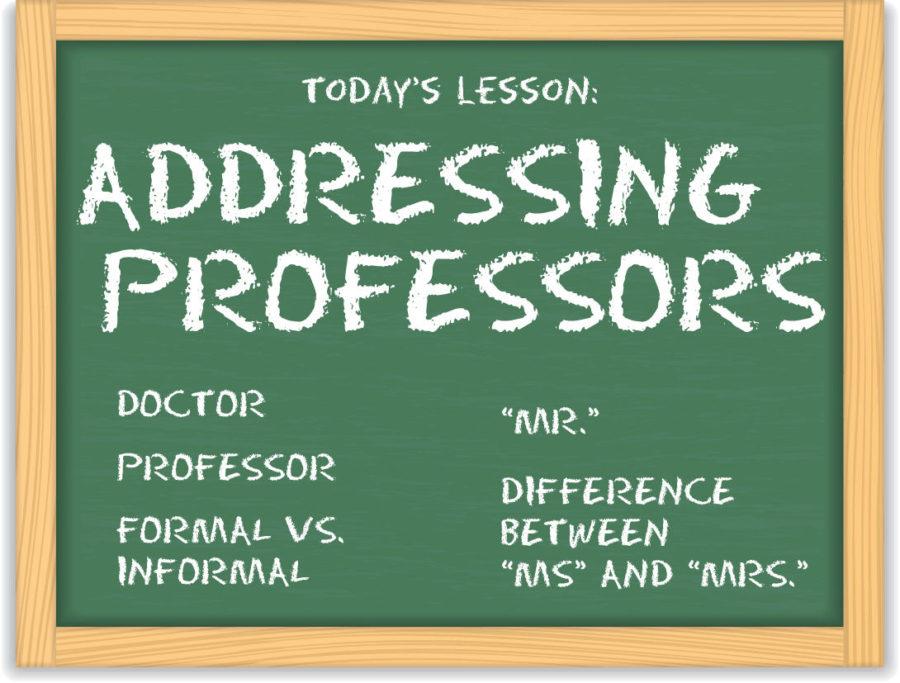It’s Mr. Professor to you
Instructors may ask students to refer to them by their professional titles. One option to find out how to address an instructor is by simply asking them.
January 30, 2015
Excuse me, sir … I mean ma’am … err?… Dr.? … Professor? … Jim? … Oh Captain my Captain?
It can sometimes be confusing to know exactly how to address an instructor, especially during the first few weeks of class. While most instructors will indicate how they prefer to be known in the first class, there are times when the proper etiquette can be mired in ambiguity.
There may be a difference depending on the setting. It might be acceptable to address an instructor by their first name while at a picnic in the park, but not when asking a question during lecture.
Brenda Lohman, who has a Ph.D. and is also an associate professor in human development and family studies, said she prefers to be addressed as Dr. Lohman in professional situations. However, she does give permission to some students to address her as Brenda during one-on-one mentoring situations. But not all students take her up on her offer.
“Some students, for whatever the reason, don’t feel comfortable calling professors by their first name,” Lohman said. “And that’s OK.”
The academic hierarchy at colleges and universities can be tough to navigate. From endowed, distinguished and/or university professors down to adjunct or teaching assistants, the system can resemble military ranks to students unfamiliar with the distinctions.
Lohman said confusion can occur even in real-world situations. She described a colleague who used her title of doctor when purchasing a plane ticket. A medical emergency occurred during the flight, prompting airline staff to ask for her assistance. The problem was that she was not a medical doctor (M.D.), but rather a Ph.D. She has since ceased using her title when purchasing airline tickets.
At some American high schools and foreign colleges and universities, any teacher can or may expect to be addressed as “professor.” Most American universities use the term “professor” to describe a person of the highest academic rank.
Kevin D. Hill, senior lecturer and adviser in the history department, who also holds a Ph.D., said addressing instructors in a professional manner regardless of position is important to maintain a student-teacher relationship and to prepare for the reality of using formal names in the professional world.
“It makes the relationship more clear,” Hill said. “Sometimes, teachers have to deliver bad news and if you don’t feel like buddies, it makes things earlier. Addressing [teachers] properly is an indication of respect for their academic accomplishments.”
Michael Bugeja, director of the Greenlee School of Journalism, said there are some simple steps students can take to avoid any mishaps.
“Always look up the name and title,” Bugeja said. “Don’t assume all professors have their Ph.D. and don’t assume all lecturers do not.”
Krista Klocke, senior in speech communication and communication studies, said she always looks instructors up before the class begins to be sure she doesn’t offend anyone.
“If I’m not sure, my default is to call my teacher ‘doctor’ unless they tell me otherwise,” Klocke said.
Learning to correspond formally with instructors via email will not only help to receive quicker and more detailed responses, but emails can contain clues about how the instructor prefers to be addressed in person, Hill said. He advises students not to use openings like “hey” or “dear” in favor of “Mr.”, “Ms.” or “Dr.”.
“It’s a matter of keeping a professional distance,” Hill said. “The way people sign their emails is probably the way they’re comfortable being addressed.”
However, if a student is not sure how to address an instructor in an awkward situation the safe bet is to go with Mr. or Ms., Bugeja said.
“In fact, at some elite universities they have handled this problem by having everyone call all their teachers Mr. or Ms.,” he said.
Students don’t always show the same amount of respect to teaching assistants as they show to professors.
“Really, the issue is if they have a master’s degree,” said Eric Danielsen, a senior in English. “If it’s a TA, then it’s just their name.”
Lohman believes some of the miscommunication may be because of a generational gap and said she has noticed older instructors often have less trouble with students addressing them incorrectly.
“I’ve noticed a difference from now than when I started 13 years ago,” she said. “I was raised in an environment where we called everyone Mr. and Ms.”
In the end, erring on the side of caution is generally the best course of action. Just remember, professors are people too and their feelings can be hurt if they feel disrespected.
“Calling a professor by their first name without permission is tantamount to calling your parents by their first name without their permission,” Bugeja said.

















